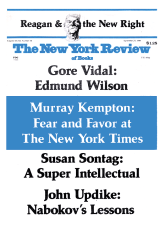I
Harrison Salisbury’s study of The New York Times is like the Times itself, painstaking but not often pain-inflicting. Burdened with the duty to be reverent, both are raised now and then to revelation—usually, in the case of the Times, toward the third paragraph from the bottom of the story.
Salisbury does not quite convince us—and who could?—that reading even the best newspaper helps us far toward understanding the way the world works. But thinking about the Times is a useful employment for anyone seeking to know how the world works; and Salisbury has done us signal service in fortifying that view.
His Times seems to have developed rather as the nation has—from a structure of innocence based on a sound foundation of commercial calculation, into a structure of commercial calculation on a foundation of estimable but enfeebling innocence. That progression is illuminated in the sermons of its founder and in the philosophy and practices of his two successor publishers:
To give the news impartially without fear or favor regardless of any party, sect or interest involved.
—Publisher Adolph S. Ochs, 1896
The Times, was prepared to print any statement made by the government if they permitted themselves to be quoted “whether we believe them or not.” However, if the government wanted something run without attribution “then we must impose our own judgment as to whether or not it is true and use the story only if we believe it is true.” [italics mine]
—Publisher Arthur Hays Sulzberger, 1954
The Director of the CIA: “I hate to bug you on this.” The Publisher of the Times: “You do not bug me ever.”
—Publisher Arthur Ochs Sulzberger, 1974
This Issue
September 25, 1980
-
1
Argyris is James Bryant Conant Professor of Education and Organizational Behavior at Harvard and was retained by Arthur Ochs Sulzberger to diagnose and treat the collective neuroses of the Times in the late Sixties. The patient’s resistance finally drove the physician from the bedside with a rancor that inspired the composition of Behind the Front Page (Jossey-Bass, 1974), a rather spiteful tract disguised as a scientific monograph, whose values are: (1) as a demonstration that, whatever may be wrong with the standards of joint stock capitalism, the standards of the academic behavioral sciences are rather worse, and (2) as a record of a revealing and occasionally distressing series of pensees uttered by Sulzberger, Executive Editor A.M. Rosenthal, and Editorial Page Director John Oakes, all masked by random initials but all easily identifiable in the context of their remarks.
↩ -
2
Not, of course, Thomas Burke, but Edmund. And then, in all probability, not Edmund either. The OED scoured Burke without finding any reference to a Fourth Estate. The quotation cited by Salisbury first appeared and was credited to Burke in Carlyle’s Heroes and Hero Worship in 1841. The OED locates “a Fourth Estate far more important than they all” in a speech of Brougham’s in 1823 or 1824. Who can say whether Carlyle misremembered or whether, in his windy way, he chose to inflate the majesty of his source?
↩ -
3
Salisbury may be more casual than he ought to be in passing dismissal of Mr. Ford’s “rather conventional plea for the $300 million he had asked of Congress to wind down Cambodia.” For, if he failed to convince the Congress, he did succeed in convincing the Times, whose editorials, with a few rather conventional admonitions to our Indochinese clients to mend their ways, generally supported the president’s requests for increased military assistance to Saigon and Phnom Penh even while Sydney Schanberg, its man in Cambodia, was making it brilliantly and irrefutably clear that the game was already up. Mr. Ford may have been languid when he turned to the subject at lunch but he was unambiguous; and the Times seems to have done pretty much what he wanted in this one case when it was sure what he wanted.
↩ -
4
Salisbury gives us all we need to appreciate how sound this caution was with the information that, when it was revealed that Adolph S. Ochs had established a family trust fund to escape the death duties that might have cost his heirs their control of the Times, Franklin D. Roosevelt expressed his outrage by calling this device a “dirty Jewish trick.”
↩ -
5
Quoted in The American Establishment, by Leonard and Michael Silk (Basic Books, 1980).
↩ -
6
Some dissatisfaction has to tinge the properest reverence for what the Times was before it began conveying those drilling rights to press agents that have lately done so much to clutter its landscape. In the early Sixties when assurance of its affluence confined its worries to preserving and increasing its eminence, then Managing Editor Turner Catledge summarized his own dissatisfaction by asking, “Why are we always surprised?”
↩





